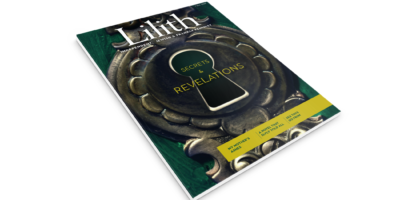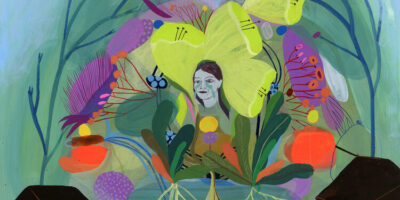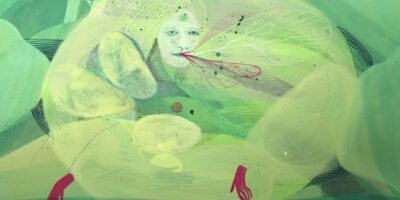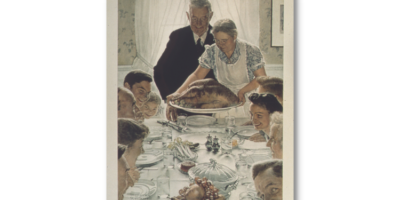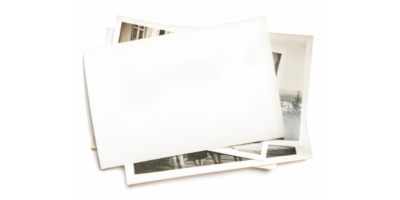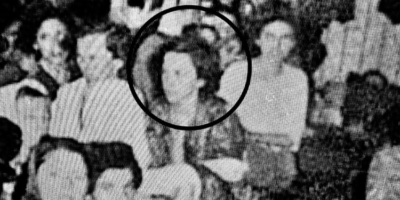
The Blue Thumbprint
Quite late in life I discovered why the world often didn’t seem real to me and I didn’t seem real to myself. I’m talking about an exasperatingly childlike approach to life that I’ve been unable to purge, and, beyond that, a way that my being is permeated by a dissociative anesthesia. All my feelings and perceptions seem to be apparitions whose presence I can outwait.The reason for this odd state connects to a secret of my mother’s, one that was revealed to me one evening when I was in college. But it wasn’t until recently that the connection came clear. Back then, we were sitting up late under the dimly glowing yellow asterisk-decorated sconces in the dinette, my father asleep in the next room, and all the bedrooms in this Bronx apartment where we four children had grown up were now empty.
My mother asked what I was reading. I held up Of Woman Born, which I was avidly underlining. Adrienne Rich described the taboo negative feelings she’d had about having children— putting into language my fears about reproducing.
My mother shook her head. “It doesn’t work like that. In the hospital, when they hand you the baby, at the same time a big basket of love arrives, at the very same instant!” There was surprise in her voice, as if the basket were truly unexpected. Then her expression clouded, and she sighed. She looked very sad. “I want to tell you something,” she said, inspired perhaps by the way I’d described Rich’s honesty. And she told me about the abortion she’d managed to obtain when abortion was still illegal, and why she’d needed an abortion in the first place.
Her obstetrician had refused to “tie her tubes,” after the birth of her fourth child, me. This was 1958. She hadn’t even wanted this many children and certainly didn’t want a fifth. She was never really interested in children. Although a vibrant and often ebullient woman, she was shy, and savored solitude, and time to read. Why did her obstetrician refuse her request? He provided no medical reason.
He saw before him a middle-class well-spoken white woman, Jewish like himself, who birthed healthy children. Reason enough, apparently. So my mother continued to rely on “the rhythm method.” When she became pregnant again, she felt frantic; there was already dangerously little of herself left. She had an infant, a two-year old and a four-year old and a six-year old. She already felt overwhelmed. My father managed to book a plane flight to Cuba, where abortion was legal. Two days before the flight, however, “a Park Avenue doctor” kindly signed a document saying that my mother’s sanity would be jeopardized if she had another child. She was granted an abortion in a hospital.
But a strange thing happened afterward. A state of depression set in. Her body, recently flush with hormones, suddenly was not. The psychiatrist’s solution was electroshock. This was, of course, in the bad old days when electroconvulsive treatment employed much more electricity than it does now. Shock treatment as currently administered we know can be beneficial. But for my mother, back then, it was a harrowing procedure. It was done in the basement of the hospital. She was wheeled past people who’d already received treatment. They were lolling in their chairs. Soon that would be her. A gray ball was put in her mouth so she wouldn’t bite her own tongue. It occurred to me to ask her what was the worst part, expecting that it was the force of the electrical jolt, but she said, “Memory loss. I didn’t know which memories would be taken away for good.”
I nodded, dubious. But my mother proved to be correct in her apprehension—as I recently discovered. The Lancet reports that since the 1950s, “evidence has accumulated that ECT caused long-term memory loss. Our research suggests that persistent memory loss is a problem for a substantial population” of those who’d been given shock treatment.
The determinative force of a blithe, patriarchal man spans the decades—a man I never met.
The parent present with me in my earliest years was a woman sitting in a narrow kitchen of blue shadows, remote, irritable, needing to be left to herself to turn the pages of her McCall’s magazine. From outside came the clamor of children playing on the pavement, and the conversation of their mothers, who were sitting on wood peach crates or lawn chairs, smoking Pall Malls.
My mother never went out to them. Yet she didn’t want to have much to do with me, either. Feeding me was tedious; dressing me was tedious, too. If I showed her a drawing I crayoned, she gazed at the page and nodded. The drawing became meager. My whole self, in a way, felt like the rumpled, smudged knees of my tights.
Lacan identifies the mirror stage as essential for the child’s development of a healthy sense of self. My mother, yearning to be alone, could not mirror me. She seemed like someone whose own soul had been submerged. She didn’t smile at my smile. She didn’t want me to touch her with my sticky hands. She seemed beleaguered, abstracted. And so somehow my own periphery didn’t seem real. I existed in a state of make-believe. The psychic state of my mother post-electroshock was, frankly, of someone recovering from a trauma. Strapped to machines, she’d been lightning-struck.
If your world doesn’t respond to you, if you live with someone who is unavailable, unattuned, it is as if you yourself are slow, logey, doleful, and vaporous. For many years I thought that I’d be able to change this internal reality. I’ve had therapy with some excellent practitioners. But the internal state remains, due perhaps to a neurological structure woven too early to countermand.
And I think of that obstetrician whose reach spans the decades. His impact descends down to my very core. It occurs to me that this aspect of my experience—the determinative force of a blithe patriarchal man—is not unusual and is growing ever more commonplace. Patriarchy is as intimate, as primal, as your own sense of what is real and unreal. It is as intimate as the materiality of yourself and your world. Sometimes I belatedly notice a blue thumbprint on my eyeglass lenses from where I grabbed them up wrong days ago. It is a furry, intricate insignia through which I’ve been seeing. That unknown obstetrician himself left the blue thumbprint shaping my vision, the pattern through which I see—an imprint that manifests in my incapacity to make decisions, my obligingness, and my own lived sense that I am so uninteresting I must rush when I speak, which has the result of making me less interesting.
When I was in seventh grade, my mother went out into the workforce again, securing a job at a local synagogue in an office with two other women. She worked mornings so that she could be home when I returned from school. Her way of being changed. She revealed herself to be a high-spirited woman who took an interest in fashion. She wore bright patterned wrinkle-free Huckapoo tops that snapped shut. She wore Italian leopard skin shoes bought on a splurge. She wore cut-glass sky blue clamp-on earrings when she went out with my father. Arpege.
On Sunday nights, happily preparing for work, she set her shoes on a piece of newspaper and polished them using a bottle topped with a foam sponge the size of a matchbook. She loved to shop for a bargain; she loved to go to free concerts in Van Cortlandt Park. She played mah jongg every Friday night and often won. She reported to me that at her graduation from Walton High School she’d been given the prize for Mercantile Mathematics. All those clever classmates of hers, but she was numerically smartest, and had been lauded for it. One day it occurred to me that this was the woman she’d been before we met.
The obstetrician is long gone, and my mother passed away as well, two years ago at the age of 100. I recall her telling me once, as we drove through the Old Montefiore Cemetery, where she herself now abides, that Dr. Wachtel, the beloved pediatrician she’d taken us to in our old neighborhood, was buried there; perhaps the obstetrician is interred there as well.
Yet he is never far from me. He pulled me into life and his mark remains. The personal is political, as the old saying goes. And the political is as intimate as how quickly you eat, the speed with which you talk, whether you feel worthy of another’s gaze, and also the very materiality or immateriality of your own perceptions. It shocks me to think that a man I never met has affected me so intimately. When men control women, the impact radiates.
Bonnie Friedman is the author of the bestselling Writing Past Dark: Envy, Fear, Distraction and Other Dilemmas in the Writer’s Life (HarperCollins) and, most recently, Surrendering Oz: A Life in Essays (Etruscan).

